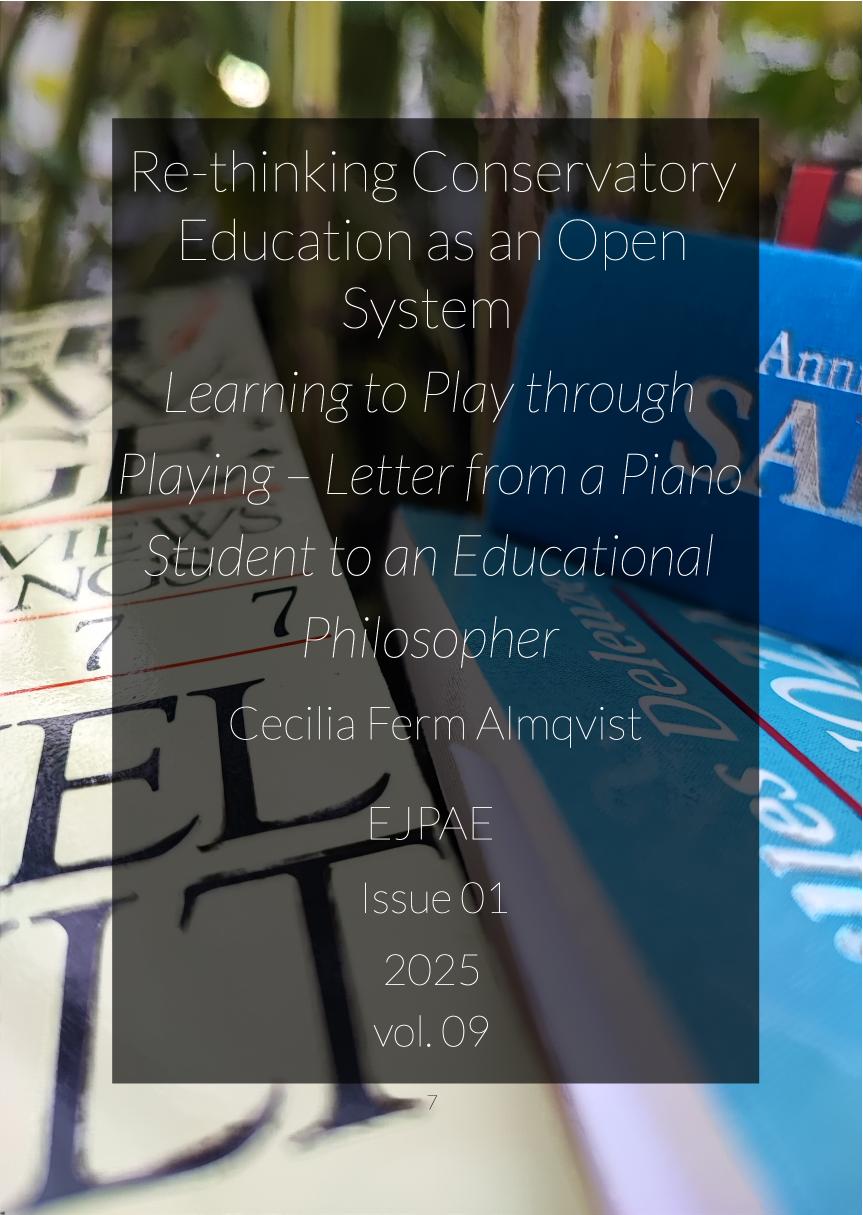Re-thinking Conservatory Education as an Open System
Learning to Play through Playing – Letter from a Piano Student to an Educational Philosopher
DOI:
https://doi.org/10.5281/zenodo.17287953Keywords:
Open system, conservatory, play, creativity, imagination, MarjanoviçAbstract
This paper is formatted as a letter from a piano student in a European conservatory educational program to Aleksandra Marjanovi? , an educational philosopher from former Yugoslavia. The student was one of 24 interviewed in a larger study concerning conservatory cultures in Eastern and Central Europe. A narrative analysis approach was taken, and the student’s expressed experiences were intertwined with Marjanovi?'s philosophical thoughts in the form of a letter. In the article the student turns to the philosopher, as she feels disoriented and had imaginatively read the philosopher’s thoughts regarding creating one’s own life plan through creativity and play (as in playful approach), as well as about education as an open system, where students’ actual social circumstances are taken into account, and transform institutional education to societal education. She feels that she has neither been encouraged nor able to create or follow any life plans through her education. Instead, she finds herself questioning the directions she was led in, if they existed at all. Her insights make her see higher music education, not least in the Western classical specialization, as a closed system, which makes her even more frustrated. Now, in her doctoral studies, she wants to discuss her experiences with Marjanovi?, whose writings recently became available in English. The philosophical exploration aims to shed light on and reflect upon how conservatory education could take Marjanovi?’s thoughts into account aiming to contribute to meaningful interrelations between conservatories and society from a democracy point of view. The specific aim of this paper is to present a view of higher music education as an open system, where students of classical music are invited to play and to create their “life plans” as becoming musicians. Throughout the paper the ambition has been to stay as close as possible to the original student interview transcription as possible.

Downloads
Published
Issue
Section
License
Copyright (c) 2025 Cecilia Ferm Almqvist

This work is licensed under a Creative Commons Attribution 4.0 International License.
EJPAE provides immediate open access to all its published content. Users do not need to register or pay to read content.
https://creativecommons.org/licenses/by/4.0/
Authors of content published in European Journal of Philosophy in Arts Education (EJPAE) retain the copyright to their works. Content is free to be used by anyone as long as you "[...] give appropriate credit, provide a link to the license, and indicate if changes were made. You may do so in any reasonable manner, but not in any way that suggests the licensor endorses you or your use." and "No additional restrictions — You may not apply legal terms or technological measures that legally restrict others from doing anything the license permits." (from the Creative Commons licence agreement)
EJPAE does not charge any author or publication fees.
Authors are encouraged to deposit the final published version of their article for self-archiving (author's personal website) and/or archiving in an institutional repository immediately upon publication.




